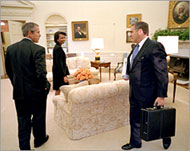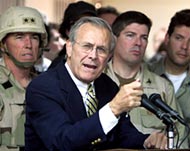CIA blasted for false Iraq WMD claims
US intelligence agencies have been severely criticised by a Senate inquiry for exaggerating the threat of Saddam Hussein’s weapons – but critics call the findings a “white wash”.

The Central Intelligence Agency and others not only overstated the threat but ignored contrary evidence before the US-led invasion of Iraq last year, a Senate committee announced in Washington on Friday.
But critics have dubbed the 500-page report a “white wash for the White House” that ignores the Bush administration’s alleged manipulation of evidence to justify the invasion and occupation of Iraq.
The Senate Intelligence Committee blamed the CIA and fellow spy agencies for “a series of failures” that a Democrat senator said had led to a war that the US Congress “would not have voted for” had the intelligence been accurate.
The Bush administration and close allies such as British Prime Minister Tony Blair based their case for war against Iraq on claims that ousted President Saddam Hussein possessed stockpiles of chemical and biological weapons and was trying to develop nuclear weapons.
But no stockpiles of banned weapons, nor evidence of a recent programme to develop any, have been found since the US-led invasion and occupation in March 2003.
‘Unsupported’ allegations
The committee chairman, Republican Senator Pat Roberts, said the so-called evidence relating to Iraqi weapons was “unreasonable and unsupported”.
 |
|
George Bush (L) in June praised |
“Most of the key judgements in the intelligence community’s October 2002 National Intelligence Estimate … were either overstated or were not supported by underlying raw intelligence,” the report said.
It singled out former CIA director George Tenet, accusing him of exaggerating the risk to White House officials and ignoring dissenting views from other intelligence agencies.
Tenet resigned citing “personal reasons” on 4 June, amid widespread criticism that he had not provided accurate intelligence about Iraq and had failed to prevent the 11 September 2001 attacks.
The committee report has also dismissed repeated White House claims of any meaningful relationship between Saddam and al-Qaida.
Bush absolved
But the report rejected claims that the Bush administration applied pressure on analysts to reach conclusions that would justify attack Iraq.
President George Bush called the committee’s findings “useful” and insisted that Saddam Hussein had been trying to develop weapons of mass destruction.
But Democrats on the Senate committee insisted the Republican White House had pressed intelligence analysts to provide the justification it needed to pursue a war on Iraq.
The leading Democrat on the committee, Jay Rockefeller, said the intelligence failures would haunt US national security “for generations to come”.
“Our credibility is diminished. Our standing in the world has never been lower,” he said. “We have fostered a deep hatred of Americans in the Muslim world, and that will grow. As a direct consequence, our nation is more vulnerable today than ever before.”
White House accused
Critics of the Bush administration told Aljazeera.net the report was a flawed and an incomplete assessment of how intelligence was used to justify attacking Iraq.
 |
|
Critics allege Defence Secretary |
“It’s a white wash for the White House,” said Robert Boorstin, senior vice president for national security and international policy at the Center for American Progress, a liberal think-tank in Washington.
“It lifts all the blame from top officials who manipulated evidence to suit the administration’s policies,” he said.
Boorstin said the Senate committee failed to study key issues such as the administration’s manipulation of intelligence and its reliance on testimony from Iraqi exiles, which has since been widely discredited.
He said the committe had also failed to examine the “unprecedented” role of the controversial Office of Special Programmes, an agency controversially set up by Defence Secretary Donald Rumsfeld to find evidence of illicit Iraqi weapons.
Some Republicans on the committee successfully delayed the second part of the report – on how the Bush administration used the intelligence – until after the November elections.
Iraqis unsurprised
Political analysts in Baghdad said the findings would confirm widespread suspicions that the US had manufactured its justification to invade the oil-rich country.
“The media and people in general have always doubted US intentions and the existence of Iraqi weapons of mass destruction,” Professor Abd al-Sattar Jawad of Baghdad University’s journalism department.
“Toppling Saddam Hussein was good news for many, but we didn’t want to eject him using lies and false evidence,” he told Aljazeera.net. He said the US faced a difficult task to repair its image throughout the Middle East.
A political scientist at Baghdad University, professor Dr Abd al-Jabbar Ahmad Abd Allah, echoed Jawad’s assessment and said some of the discredited intelligence had come from senior Iraqi officials working for the CIA.
The Senate committee’s findings, Jawad added, would also harm the credibility of the interim government, most of whose leading members were formerly exiles who had “misinformed” the US to persuade it to invade Iraq.
“This is embarrassing for the government, they will be unhappy about the news. Damage has been done.”